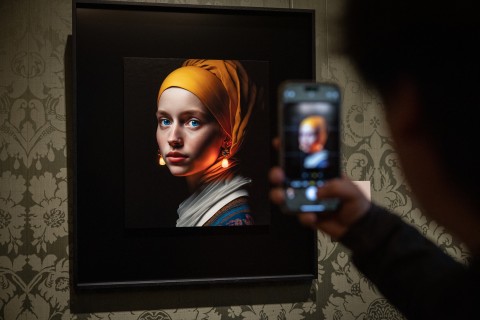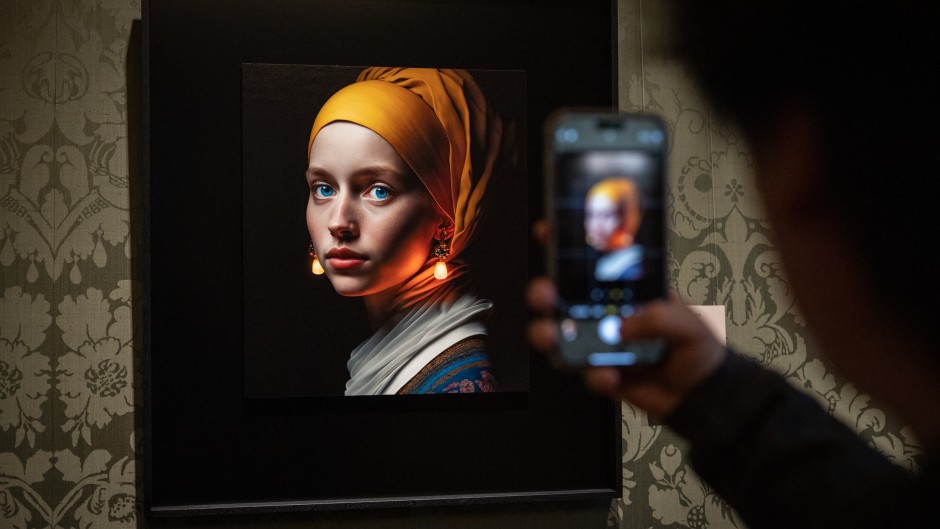
AMSTERDAM - At first glance, it seems to be just a modern take on Johannes Vermeer's masterpiece "Girl with a Pearl Earring". But look more closely and things get a little strange.
Firstly, there are two glowing earrings in the image hanging in the Mauritshuis museum in the Dutch city of The Hague. And aren't those freckles on her face actually... a slightly inhuman shade of red?
That's because the work -- one of several fan recreations replacing the 1665 original while it's on loan for a huge Vermeer show at Amsterdam's Rijksmuseum -- was made using artificial intelligence (AI).
Its presence has sparked a fierce debate, with questions over whether it belongs in the hallowed halls of the Mauritshuis -- and whether it should be classed as art at all.
"It's controversial, so people are for it or against it," Mauritshuis press officer Boris de Munnick told AFP.
"The people who selected this, they liked it, they knew that it was AI, but we liked the creation. So we chose it, and we hung it."
- 'Frankensteinish' -
Berlin-based digital creator Julian van Dieken submitted the image after the Mauritshuis asked people to send in their versions of the famous painting for an installation called "My Girl with a Pearl".
Van Dieken said he had used the AI tool Midjourney -- which can generate complex pictures on the basis of a prompt, using millions of images from the internet -- and Photoshop.
The Mauritshuis then chose it as one of five images out of 3,482 submitted by fans that would be printed and physically hung in the room where "Girl with a Pearl Earring" is normally housed.
"It's surreal to see it in a museum," van Dieken wrote on Instagram.
The budding artists ranged in age from three to 94, depicting the "Girl" in diverse styles ranging from a puppet to a dinosaur and a piece of fruit.
But the decision to choose an AI-generated image sparked a backlash.
Dutch artist Iris Compiet said on the Instagram feed for the Mauritshuis exhibition that it was a "shame and an incredible insult", and dozens of others piled in.
"It's an insult to the legacy of Vermeer and also to any working artist. Coming from a museum, it's a real slap in the face," Compiet told AFP.
She said AI tools breach the copyright of other artists by using their works as the base for artificially generated images, as well as scraping the data of internet users in general.
The image itself she described as "almost Frankensteinish".
Artist Eva Toorenent, of the European Guild for Artificial Intelligence Regulation, criticised what she called the "unethical technology".
"Without the work of human artists, this program could not generate works at all," she was quoted as saying by the Dutch newspaper De Volkskrant.
- 'What is art?' -
"It's such a difficult question -- what is art, and what is not art?" said the Mauritshuis's de Munnick.
But he insisted that the museum, whose collection boasts three Vermeers and nearly a dozen Rembrandts, had not deliberately set out to make an artistic statement on AI.
"Our opinion is, we think it's a nice picture, we think it's a creative process," he said. "We're not the museum to discuss if AI belongs in an art museum."
He admitted though that "up close, you see that the freckles are a little spooky."
Visitors to the Mauritshuis were equally divided, he added.
"Younger people tend to say, it's artificial intelligence, what's new. Elderly people sometimes say we like the more traditional paintings."
The Mauritshuis was looking forward to the return of the real "Girl" in April, he added. The painting's fame has increased in recent years due to a 1999 novel by US author Tracy Chevalier and an ensuing Hollywood film.
"Well, she is beautiful in the (Rijksmuseum) exhibition... But we will be very happy when she is at home."

